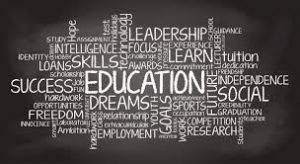This is a guest post by Ola (@m_careca5) and was first published on my2kobos.

There is the universal acceptance of education as a form of investment in human beings which yields economic benefits or returns and contributes to a nation’s future wealth and development by increasing the productive and consumptive capacity of its citizens*
We would agree to a great extent that education is not an end in its self but a means to an end. On completion of a form of education; and by this I mean formal and informal forms of educational arrangements to impact knowledge or train in special skills; the success, fulfilment, achievement or otherwise more often than not rests partly on what individuals make of it afterwards and what value(s) society attributes to education in relation to its development.
Education is important but more importantly ready access to education at the primary, secondary and tertiary levels by members of a community or country is paramount.
In modern societies, governments have the primary role of formulating educational policies that guide and continually monitor the administration and delivery of quality education, curriculum content that meets the needs and realities of the nation’s growth and development plan. And most importantly, the provision and sustenance of qualitative education at different levels should not undermine the ease of accessibility to basic education by all and sundry.
Looking back in history, the free education programme introduced by the then government of the Western Region (Nigeria) led by Chief Obafemi Awolowo’s Action Group political party, captures the sense of the provision of an education policy and administration that successfully caters for the citizens.
The proponents of free education’s laudable vision saw the successful implementation of the first free education in Nigeria for school-age children up to 18years. This education-for-all programme was rolled out in cities, towns and villages across western Nigeria. The largely agrarian West welcomed the opportunity to educate their children while government foots the bill. The education-for-all programme was so successful that the leaders of the Eastern and Northern Regions (Dr Nnamdi Azikwe and Sir Ahmadu Bello) emulated this approach to public education for the potential development of their regions too. Apparently pre and post independent Nigeria was caught in the ‘free education’ frenzy.
A remarkable feature of the educational reform of this era was the rapid numerical growth of schools at all levels–primary, secondary (modern and grammar) as well as tertiary. Teacher training institutions were equally expanded, all with the aim of translating the proposal of the government into reality.*
The derivative quality and standard of education from this era was adequately supported by sound education policies, capable and visionary leadership, dedicated workforce that saw administrators, teachers/lecturers and community play strategic roles in the overall success of the public education programme. Whispers in the shadows attribute the high proliferation of educated elites from the western part of Nigeria to the free education policy of this epoch. Literacy and numeracy were largely promoted within the curriculum among other vocational skills training, post primary school.
An ample demonstration of the Western Region government’s prioritisation of education is evidenced in the share of the region’s recurrent budget allocated to education for 1958- 59 financial year- 41.2%.
As at then,
this, undoubtedly, represented one of the highest proportional expenditures on education, the world over.*
The military interruption in power and the civil war, a couple of years after independence (1960), cut short the progress in the propagation of this educational scheme by the regional government.
A successful and meaningful institution/policy/invention will most likely outlive its era and necessarily its proponent/inventor (circa- Apple products to late Steve Jobs, as would Microsoft products to Bill Gates in future).
So from 1970, the new government tapped in to the wholly positive potential of the free education policy as part of its national unification agenda and grassroots educational development through the Universal Primary Education (UPE) programme. Hence, the investment in education became a national agenda and millions of Nigerian children were able to attend free compulsory schooling from primary to junior secondary and through to senior secondary. The tertiary institutions were managed by the government at the federal and state level as well.
The populace’s access to free public education with quality standards helped produce an educated and adequately trained workforce that took up positions, 25 years post-independence, in civil service, governance and private sector across the country. The educational administration and implementation saw the production of a reliable and capable generation of graduates (at different educational level) up to the late 90s. I was as a product of state education from this era and the standard can’t be compared to the represent day public schools.
Even though we were of the opinion that the standard of that era could be better, it made a whole lot of sense and contribution to moulding us as students if compared to public school education today. My first three siblings and I graduated from state primary and secondary schools in the late 90s, and a couple of years after us, my parents couldn’t rely on the once good standard of public schools for our last two siblings. I remember my mum, and indeed lots of parents back then, quibbling about the drastic drop in standards of primary and secondary education. My siblings went on to fee-paying model boarding-schools for the quality of education my parents sought; a standard which was available to her older children in public schools once upon a time.
Going forward, the standard of education, especially in public schools, kept falling. This created a void for those in search of quality standard of education and fee-paying private schools sprung up in nooks and crannies of the country to serve this new clientele. Education became big business for the private educationists while standards in public schools kept declining.
It was a free for all, the private schools didn’t have adequate government policies to guide and monitor the administration of education as such and some were not even up-to-scratch in teaching terms. Teaching profession became unattractive in public primary and secondary schools, infrastructural decay has set in without bailout, maladministration of education is at its lowest ebb. There are hardly vocational training centres anymore; universities lack adequate funding, conducive lecture rooms/theatres and functional equipment for academic research amongst other unavailable necessities that contribute to the rigour of academic excellence.
Arguably, a large percentage of graduates from tertiary institutions are at best half-baked and barely ready to hit-the-ground-running in the employment market unlike their predecessors in the 70s & 80s. Our current educational system isn’t grooming and producing nation builders any more. How did it all go wrong for a country with great potentials and promises of a fruitful future with a stellar start to education administration?
What has been responsible for these decline and troubles plaguing the education sector? Could it be garbage policies and “shitty” administration? Shifts in societal values and priorities? Recent government’s indifference towards education? Never ending cancer of corruption? Lack of visionary leadership? With all these in mind, another pertinent discourse rests on how to get education back on track?
*Ajayi, S. Ademola (1984) “The Development of Free Education in Western Nigeria, 1952-1966: An Historical Analysis”. Unpublished MA Dissertation, Department of History, University of Ibadan, Ibadan, Nigeria.
The facts, opinions, views or positions expressed or established in guest posts represent that of their writers and not necessarily of www.edusounds.com.ng.
Please, leave your thoughts on this post in the comment section and feel free to share the article with your contacts. Thanks for taking out of your precious time to read my article/s!
If you like this post, kindly subscribe and/or follow me on Twitter @otukogbe and @EdusoundsNg or on Facebook at edusoundsng.





Nice to bring this to public discuss. It is not a hidden fact that almost everything in Nigeria is deteriorating, education inclusive if not the most affected. The bulk of the cause will lie at the backyard of the government. The education we have now does not depict the kind of people we are, no reckon given to our potential as a people, our cultural values trampled upon and gradually we will be faced with identity loss (that is if we are not yet in the mess already). Education to us has been limited to certification. Now you have lots of certified people who can’t impact knowledge. That is what you see in teachers in public schools with the effects seen in the products the schools bring out yearly…. the students.
Before we know rhymes that encourage seeking knowledge as that is is the only sure way for future success and development, now those rhymes are no more, because what has the society made of those that went to school? Absolutely nothing! On the other hand those that do not depict our morals and values and probably touts or school drop outs are now our celebrities.
In a society with this kind of mind set what becomes of them?
Thanks for the insightful comments.